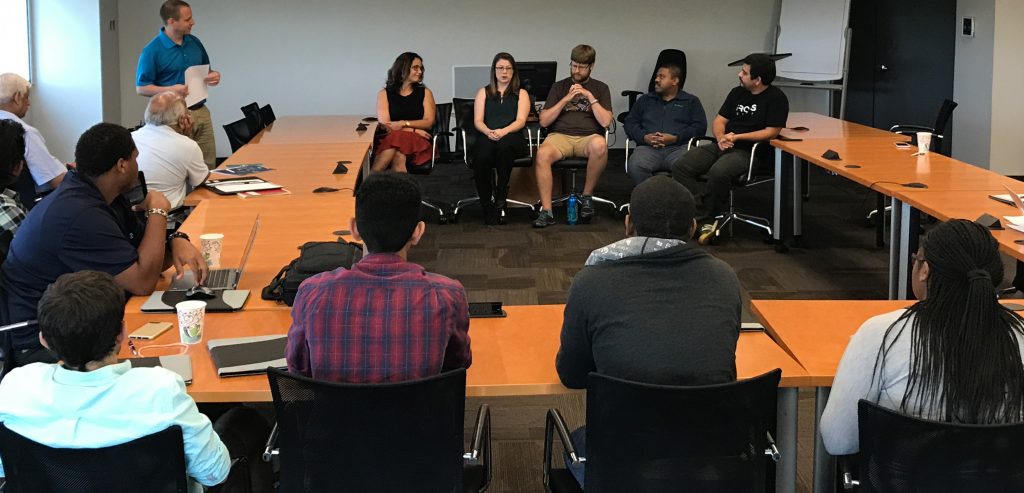On July 21, RENCI hosted 11 students and two professors from the National Science Foundation’s Research Experience for Undergraduates (REU) program. The program allows undergraduates to actively participate in research in any of the areas of research funded by the NSF. REU projects involve students in meaningful ways in ongoing research programs or in research projects specifically designed for the REU program. As a part of their REU experience at North Carolina A & T State University, a group of undergraduate students from diverse backgrounds and several universities came to RENCI for an educational tour.
The visit began with a tour of the RENCI data center hosted by Marcin Silwowski, manager of cyberinfrastructure. He explained the various duties and tasks performed by the data center staff, such as running computational analyses of coastal storm surge and computing for genomic sequencing. Silowowski told the students that data storage and data clean-up (making sure data is as error free as possible) are major challenges for his group.
Chris Lenhardt, a RENCI domain scientist in environmental data science and systems, talked about environmental and geoscience modeling at RENCI, and Senior Translational Research Scientist Kimberly Robasky joined in to talk about the health sciences and bioinformatics programs at RENCI. The presentations were followed by a panel discussion with RENCI employees, who provided their insights on working in IT and research, the education needed for their jobs, and the career paths they followed that led them to RENCI. The discussion was moderated by Terrell Russell, iRODS Interim Chief Technologist, who started with a brief introduction to iRODS and RENCI. Panelist Claris Castillo, a senior computational and networked systems researcher, talked about her experience of working at RENCI and the collaborative work environment at RENCI, which makes it an enjoyable place to work. Another panelist, iRODS User Interface Designer and Developer Cesar Garde, agreed with Castillo’s assessment.
“Research is different than a for-profit business; sometimes you actually have the chance to ponder, explore and see what comes out,” he said. “What comes out with our team (the iRODS development team) is well-crafted software. We conduct science and research the proper way here.”
After the panel discussion, every student had the opportunity to present their summer research projects to all of RENCI. The presentations followed the 3 x 5 rule: no more than three slides and five minutes, and included an explanation of the research problem, the work done to address it, and why it matters. The student topics were wide ranging, from mathematical modeling and analysis of HIV to hydrological modeling of a watershed to using high performance computers to develop self-driving cars.
The visit was arranged by Bala Ram, a professor and associate dean for academic affairs in the NC A&T State College of Engineering. Ram leads an REU site at NC A&T State focused on engineering modeling and computational research. The students who participated in the RENCI visit came from seven different colleges and universities, including four from NC A&T State.
For more information on the NSF REU program, click here.
-Deepti Kumra, student intern, project management



